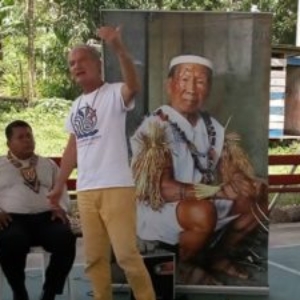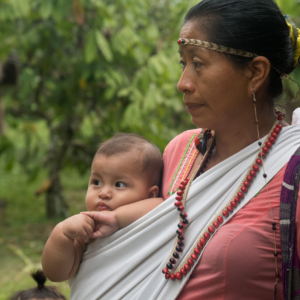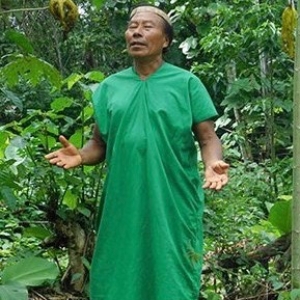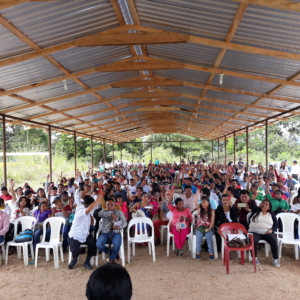“In the indigenous world, traditions teach that to “live well” one must value the knowledge and wisdom of the elderly, as well as maintain a respectful and harmonious relationship with nature”
"To have a positive effect on the health and healthcare of indigenous peoples in Amazonia requires, first and foremost, an understanding of what health means from an indigenous perspective. Indigenous concepts of health are quite different from those of Western culture, as are the practices that successfully promote health. Failure to appreciate these distinctions seems to be one of the main causes for the lack of positive results that has characterized most of the Western-sponsored health programs and projects carried out amongst indigenous peoples in Amazonia over the past decades, such as the Primary Healthcare Strategy (PHC) promoted by the World Health Organization (WHO), since the 1980's.
For indigenous people, the health of individuals cannot be separated from the health of their culture and the health of their environment (territory). Of course, the situations of indigenous peoples can be very different from one another, and their cultural systems in different degrees of wellness or disintegration, but one thing is clear: the more a people's culture has deteriorated, the more challenging it is to maintain individual health. This is especially true if a culture has reached the point where the memory of their "law of origin"—a critical pillar of cultural identity—has been lost. After decades, even centuries, of colonization and acculturation, this today is what many of the indigenous peoples of Ecuadorian Amazon face. Ancient socio-environmental norms are not respected and ceremonies are not practiced; traditional knowledge and patterns of social behavior, which once served to maintain a strong, healthy culture are no longer being upheld, let alone transmitted to younger generations; preventive disciplines, such as the ritual ingestion of important medicinal plants, are slowly being abandoned. Thus, the disorders which manifest within individuals are, at a deeper level, symptoms of problems in the socio-ecological and spiritual realms.
A different—and more effective—approach to indigenous health begins with looking at how individual health relates to the health of both culture and nature, for these are highly interconnected. This is what the Sacha Warmi Foundation does; we support the Kichwa people of Pastaza by walking alongside them and reflecting with them on the meaning of indigenous health and healthcare today. We help them re-discover how to reclaim their dignity, power, and health through using the resources they have available to them right in their own territory. We support them in achieving their goals of self-determination and autonomy. This is what the workshop presented in this video was about." - Didier Lacaze / Executive Director, Intercultural Health Program
Read More
The Sacha Warmi Center is the headquarters of the Sacha Warmi Foundation. It is located on the road between Puyo and Macas (25 km) in the province of Pastaza. Its facilities serve for meetings with leaders of the Board of Directors of PAKKIRU and other groups, training workshops for indigenous health agents, cultivating and processing of medicinal plants, as well as the regeneration of ecosystems and reforestation. The Sacha Warmi center is a center of reference, documentation and information on indigenous health and traditional medicines in the Amazon.
“We support the revitalization of their cultural systems, especially relating to health and traditional medicine, as well as the preservation of their natural resources, with the aim of improving the well being of peoples in the Amazon.”
With your support CSEE has been able to help support the mission of Sacha Warmi Center to train indigenous healthcare workers, create communication initiatives between western healthcare agents and local indigenous practitioners, and assist in the creation of audiovisual material cataloging medicinal plants and their uses.
Additionally, Sacha Warmi supports an association of Quechua midwives to promote the accessibility of healthcare and reduce infant mortality rates, and provides western-trained Ecuadorian medical students with immersion opportunities to facilitate intercultural learning and increase the respect of indigenous cultures.
Health, from the indigenous worldview, is the result of the application of norms, knowledge and traditional practices of each indigenous people and culture. These are the preventive measures, the prohibitions, the codes of behavior, food and diet, the use of medicinal plants, the healing rituals, the relationship with spiritual beings and with the territory as a whole, among many other elements that characterize the traditional system of health of each people and culture.
From an early age, children and young people receive from their parents, teachings and practices that are of a preventive nature, in order “to not get sick” or “to resist diseases”. Therefore, drinking guayusa (Ilex guayusa) or yoco (Paullinia yoco), taking morning baths, the fasts, and other natural remedies, will strengthen the spirit of the young man/woman and will make him/her have good vision and direction in his/her life. To maintain health, it is also important to preserve good relationships between people, families and other social groups. To achieve this, one must act in a generous, caring and supportive way.
Heath situation in the indigenous communities:
To address the current health problems of indigenous populations in the Amazon, it is necessary to understand the structural conditions that generate these problems. Many current illnesses and diseases are manifested by the deterioration of the general life conditions in their territories. It is not only the scarcity of food resources, deforestation or water pollution, among other factors, but also the abandonment of knowledge and traditional health practices, the negligence of preventive disciplines and the aggravation of intra and inter-community social conflicts.
Read Less
Location
Pastaza, Ecuador
Timespan
2017 - Current
Community
Kichwa
Language Spoken
Quechua, Spanish
Focus
Your donations help reserve indigenous health care methods.


















